Water! How we take it for granted.
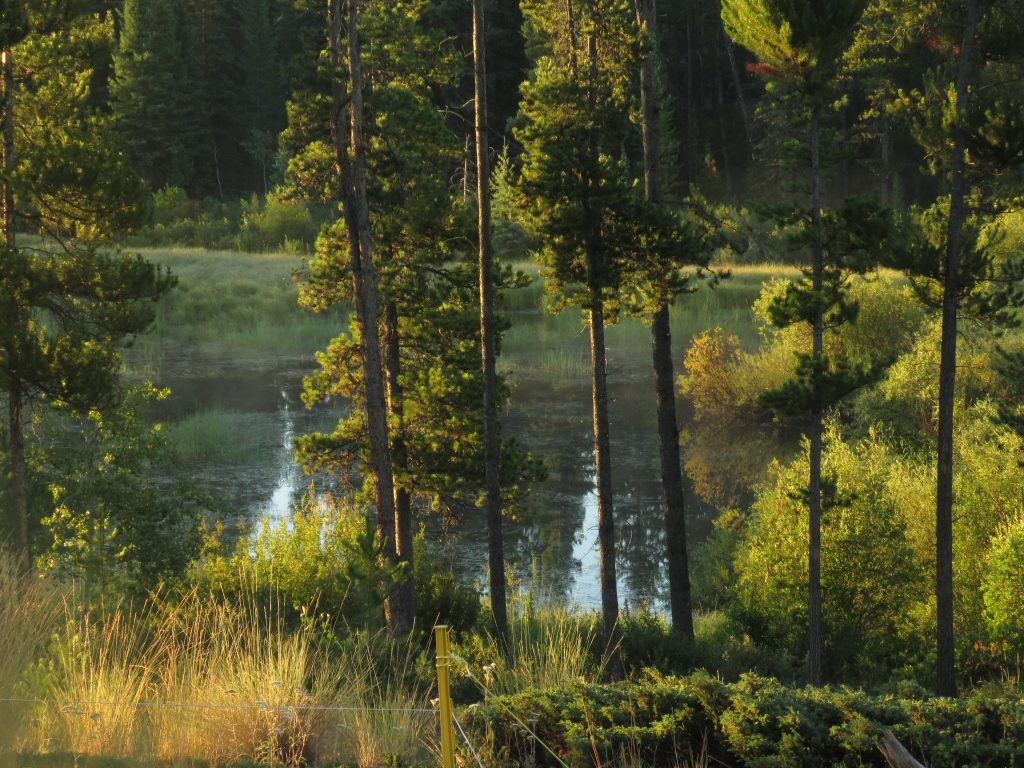
In previous years, this pond has dried up completely, but since beavers dammed the little creek in 2019, the pond has remained full. The last two summers have been wet ones and no doubt this has helped.
I was going to write a post called The Soap Opera Of The Pond. But the distance from my deck is just enough to make all the pictures I took of such poor quality it would be visually very boring. So I will have to give you word pictures instead.
The beavers have totally transformed my view. The full pond last year must have encouraged all sorts of duck food to thrive, and for several weeks there was a constant showing of several duck species. Best of all, I have observed six different sets of baby ducks. The first, a common goldeneye, lost her babies after a few days. A bufflehead kept her four young until they were half grown then they gradually reduced in numbers. The goldeneye absolutely hated the bufflehead. She was twice the bufflehead’s size but aggressively chased her every time they were on the pond together. A larger dabbling duck also had four babies – I eventually surmised she was a blue-winged teal. She kept all her babies and I still see a group of five occasionally, the young now indistinguishable from the mother. A ring-necked duck was mum #6, and those young remained for a few days before the whole family disappeared. Baby ducks are hilarious to watch. Little fuzzball, they have difficulty in diving and pop up like corks. They whizz about the surface like little clockwork toys – they can motor amazingly fast by flailing legs and wings.
Then there were the beavers, who deigned to visit occasionally (their main dam is below another pond that they created lower down the creek). They spent a surprising amount of time under the surface. They would come up clutching roots in their dextrous paws and chomp away. The pair of muskrats who had set up home in the old beaver house were exceedingly busy. They packed home hundreds of bunches of sedges – their arrow wakes in the water much broadened by these enormous plumes of green leaves. They looked so unwieldy, but they were able to dive with them to enter their lodge. What they used them for is speculation. They must have been eaten as there would not have been room to pack all that material into their house. After a while I saw a couple of muskrat, adult size, who swam and dived with puppy clumsiness. So I assume they were babies. On the whole, the ducks ignored the muskrats, but these apparent young would chase them around the pond.
Now to the main focus of this post. Early in June, I ran out of water. I have a deep well that was drilled in 2012.
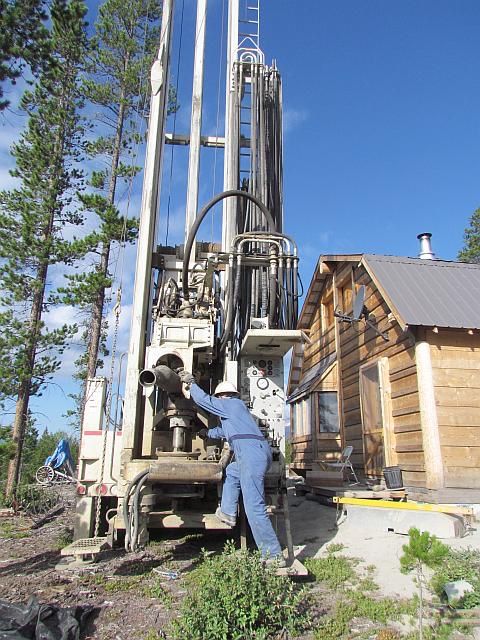
The plumbing, including a deep-water 12-volt pump, was put in later that same year.
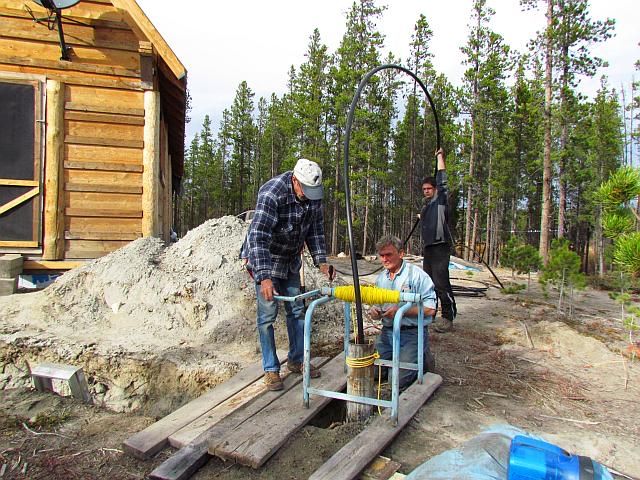
The well has never produced more than a trickle, but up to now has been enough. The water is not poisonous (many local wells have arsenic in them) but it tastes horrible, so I had a reverse osmosis filter installed. (This is not the same one that I have, but it gives some idea.)
Fortunately, when I ran out of water, I was in between volunteers. Still, I needed drinking water in a hurry, so my neighbour 10 km away at the Terra Nostra Guest Ranch allowed me to come over and collect some of their excellent water.
My first thought was to check the well. When the pump was installed, the level was 50 feet below ground. I lowered a weight on the end of a string until I felt resistance, then hauled it up, feeling the string, until it was wet. The surface was still 50 feet below ground.
People cognizant with pumps and wells, who were not super busy (the covid has in no way reduced our workloads!) are not thick on the ground here and by phoning and emailing a neighbour an hour and a half’s drive away, we determined the problem was probably a failed pressure switch, an item that kicked the deep-well pump on when the pressure tank was below optimum pressure. My neighbour had a spare one and drove over to replace it.
And everything worked fine for another month. Then the water stopped again. This time it was not making gasping noises as it had done before – this time everything was dead silent. The pressure gauge was down to zero.
The pump has a safety feature – it shuts off when the water drops below it. I did the weight and string bit – by now volunteers Daniel and Anja were with me. At 200 feet down, I met resistance. The string came up bone dry.
Last year was wet. Last winter had a little more snow than usual. May June of this year was the wettest spring on record. All the ponds everywhere were brim full.
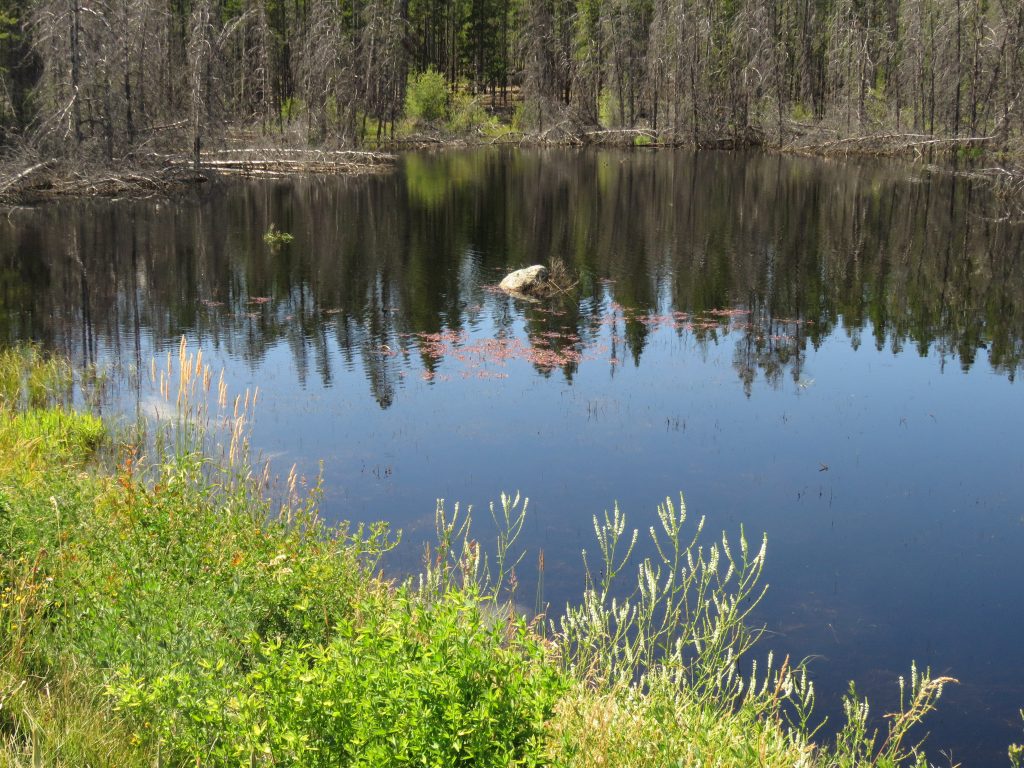
How could my well be dry?
Then followed a month of intense occupation, researching tanks and pumps, trying and failing several options, and once again hauling drinking water from Terra Nostra. One expert at a building supply firm said it is not uncommon for deep wells to go dry in a wet year as the water comes down so fast it all runs off.
I had my fire pump. Its hose throws out a large, powerful column of water (remember my fire of 2019?),
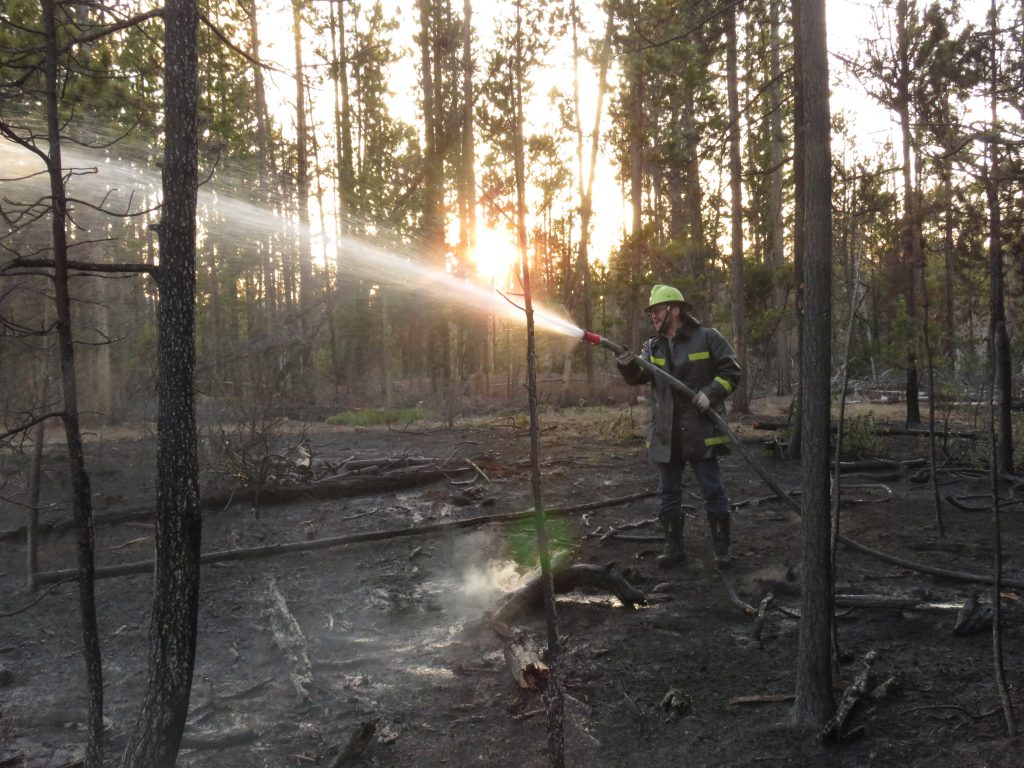
and by putting it on spray and holding it up in the air, I could water the garden. However, I was using beaver pond water, and did not fancy eating raw greens sprayed with it. Getting drinking water was a 10km round trip – too much of a hassle to use it for anything but drinking – besides I did not want to be reliant on a neighbour.
Many locals concerned with keeping their homes fire safe have acquired IBC tanks. I’d had my name down for a while, but because of my water situation, I was bumped up the list and picked one up mid June.
Several are available, but many have held chemicals – these had contained soy lecethin, which is used in a variety of foodstuffs including chocolate bars. So the content would be benign, right? They were disgusting!
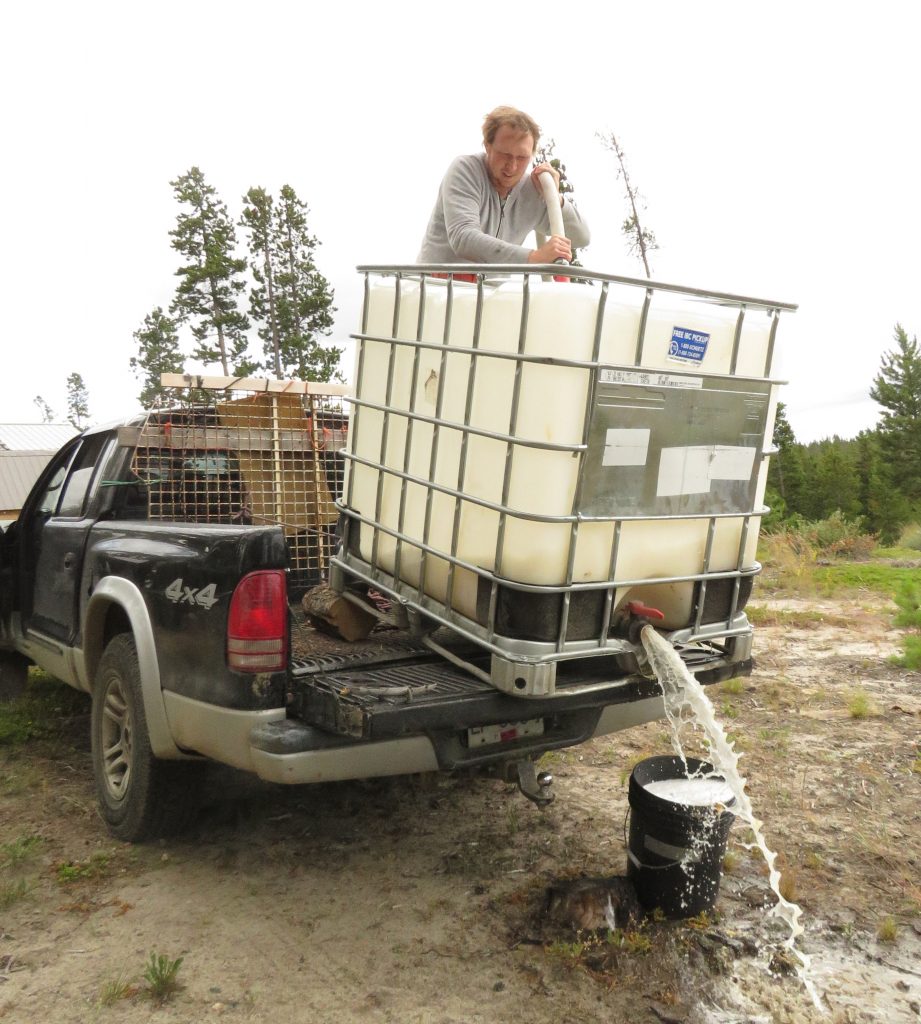
Although there was only a small residue in the bottom, it took days to clean the tank out.
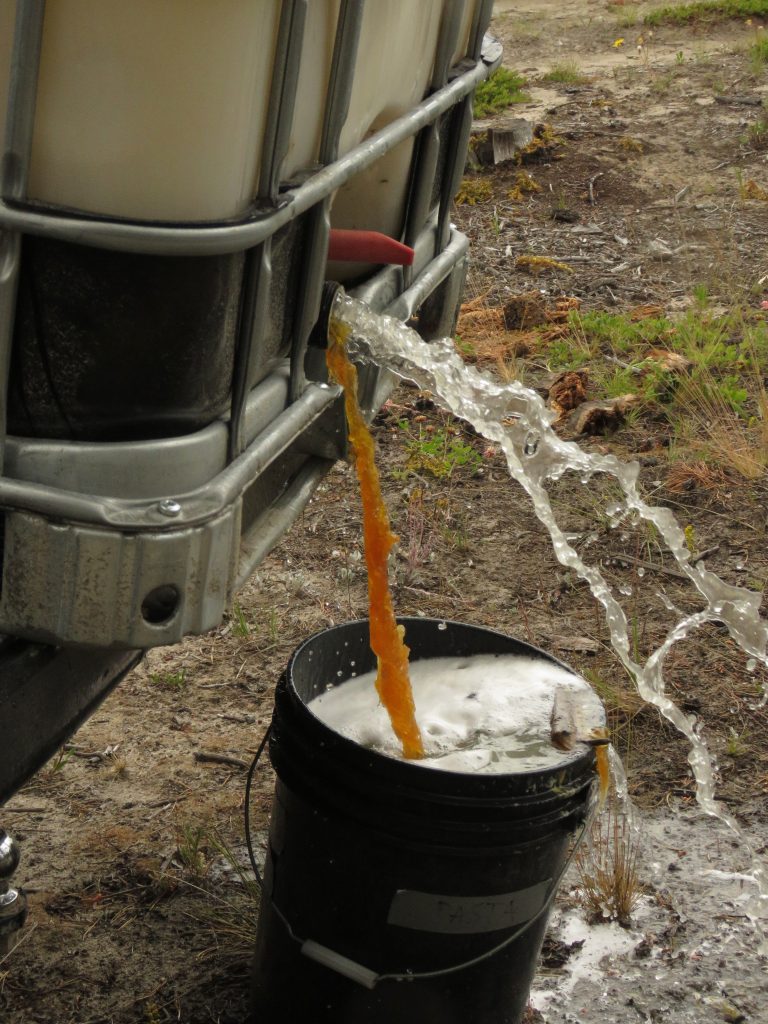
My first idea was to build a stand higher than the garden, put the tank on it, fill it with pond water and gravity feed it to the network of drip hoses used to irrigate the vegetables.
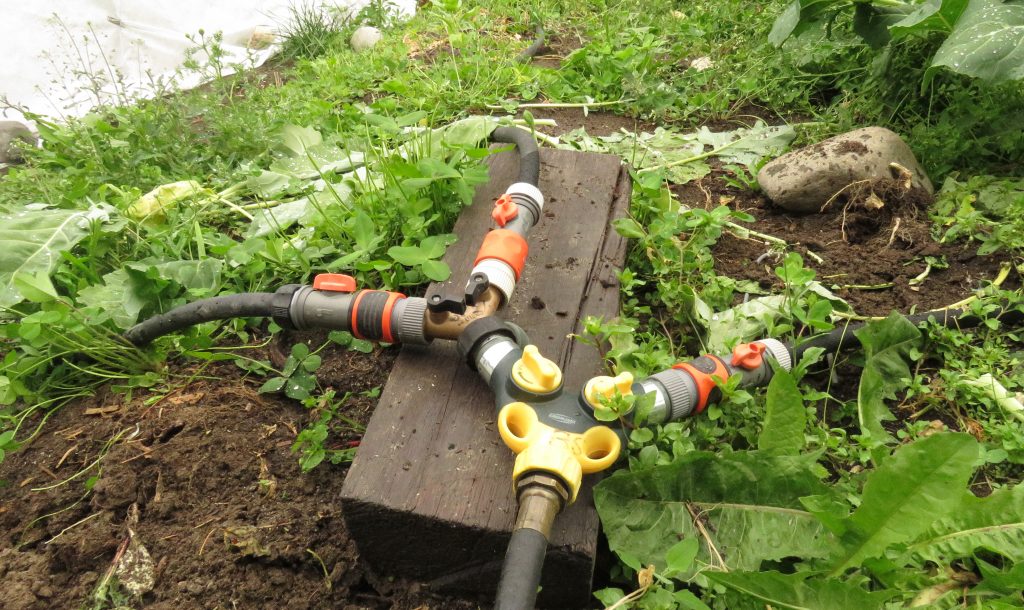
Water is heavy – the tank stand would have to be strong.
Daniel had occasionally used a chainsaw before he came to my place (as well as being a professional photographer, he is a volunteer firefighter – in a city, but a chainsaw is sometimes needed), Anja not at all. By this time they had had experience with firewood. Now they could practice notching. First onto rocks,
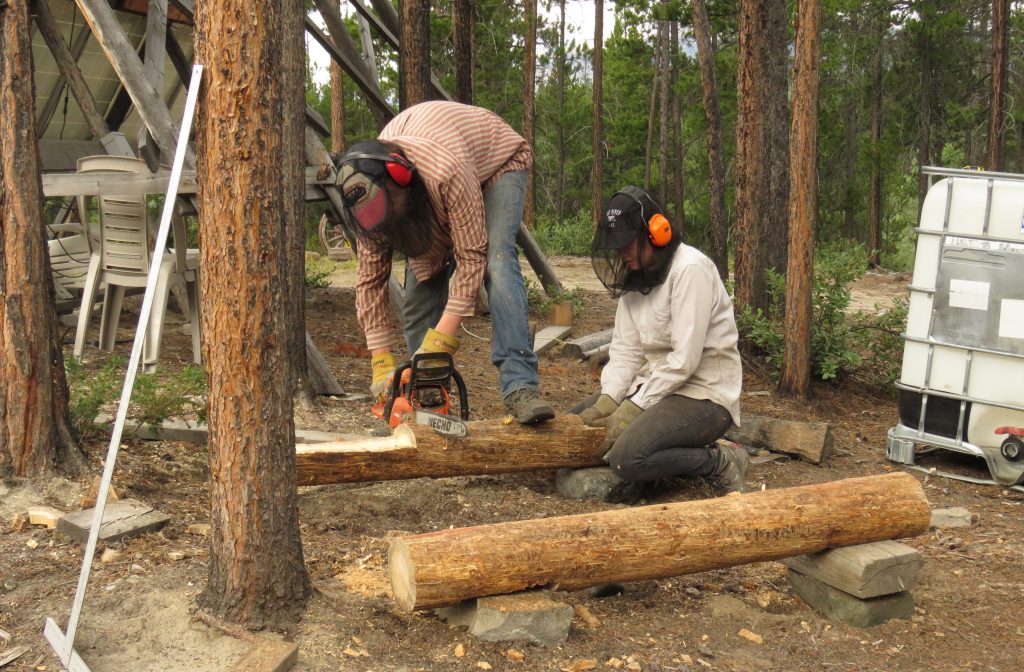
Then round notches to fit onto logs. Daniel doesn’t look much like a wedding photographer now!
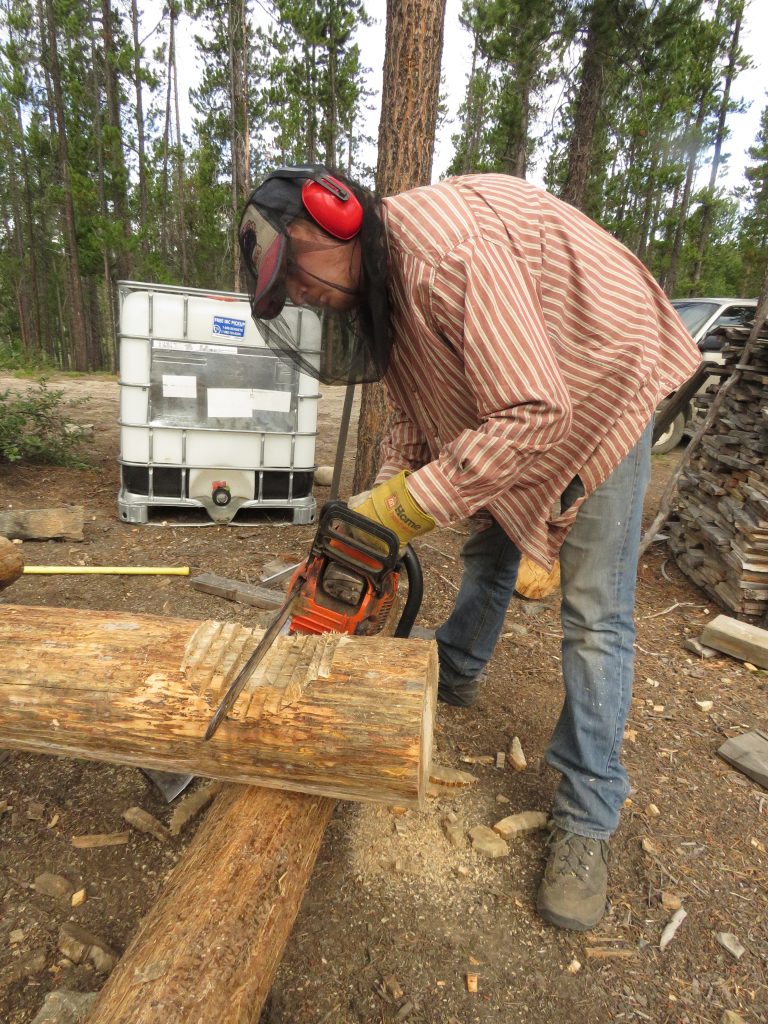
Daniel took to the business like a duck to water and was soon employing German precision.
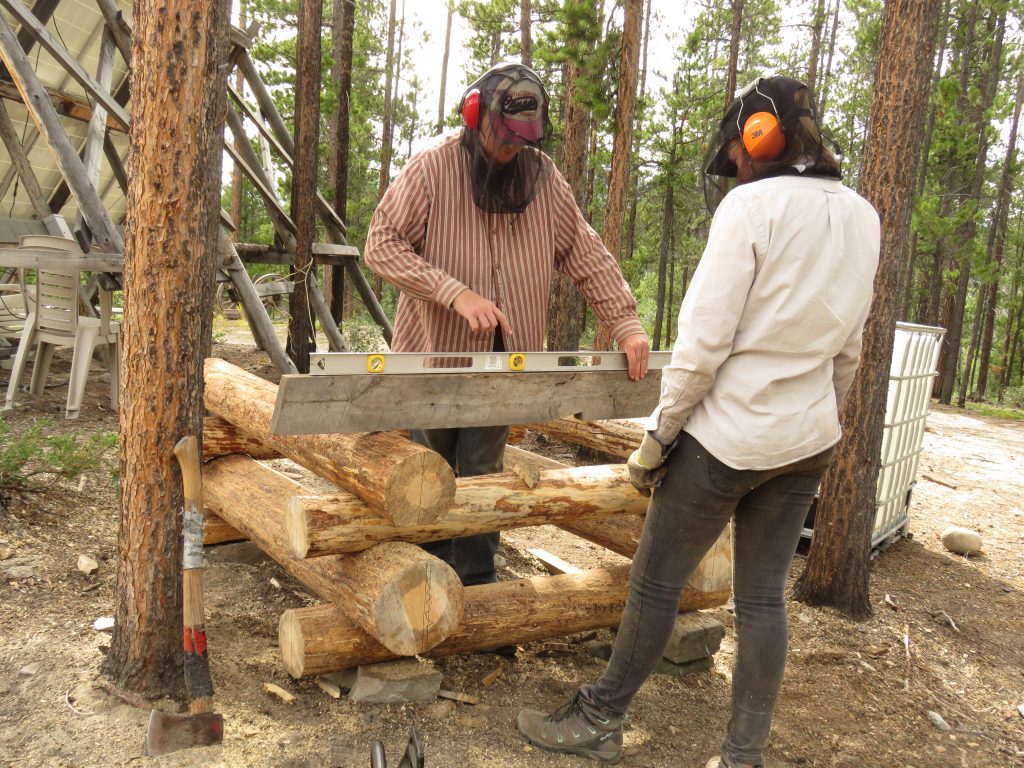
The stand itself was not enough. The sun blasted onto it and I did not want all the goodies in the water to multiply, or the plastic chemicals to leak into the water. So we built a roof.
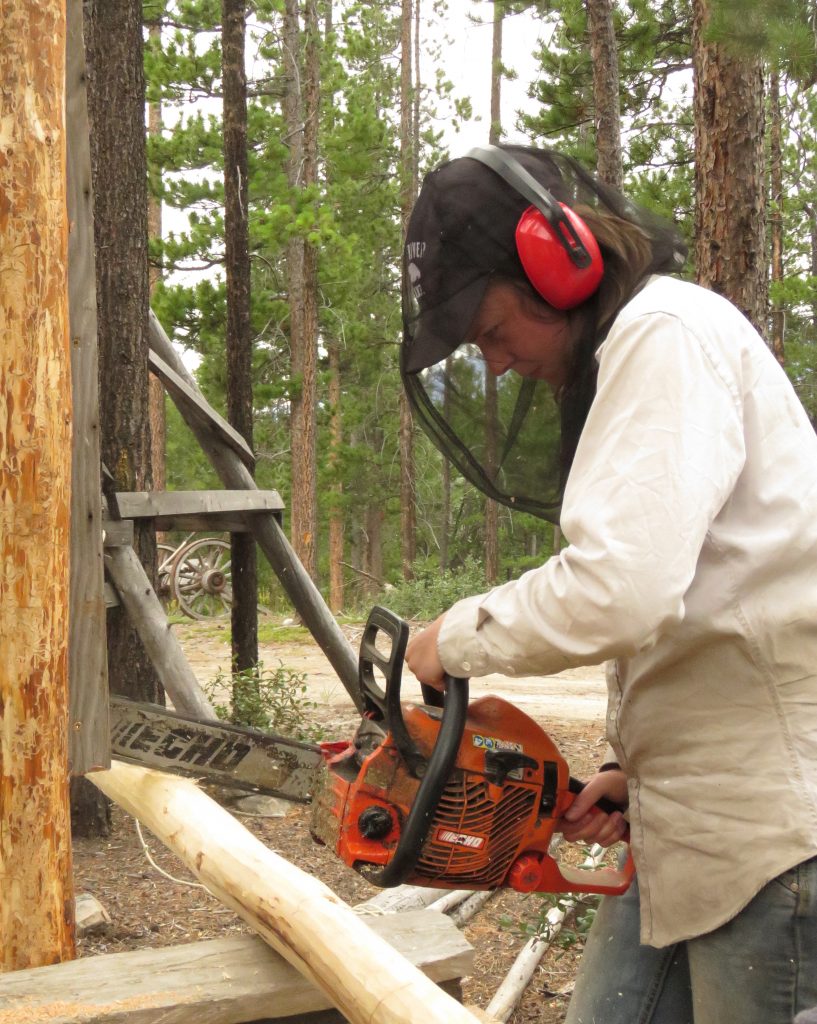
Et Voila!
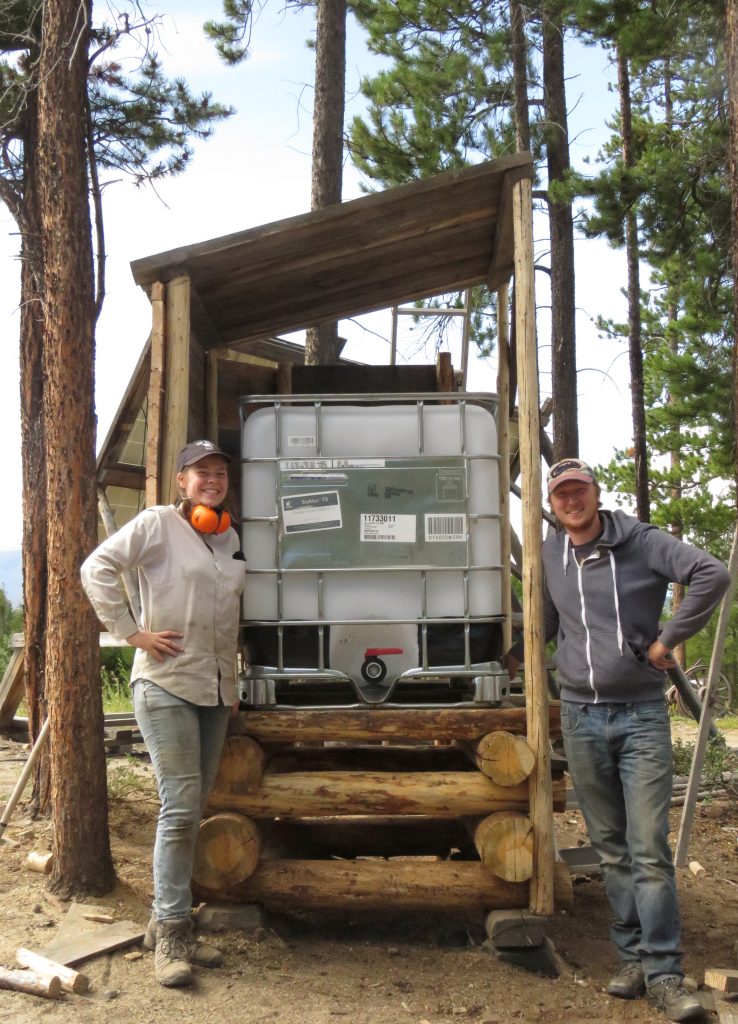
The first attempt at irrigation was a failure. We used the fire hose to pump water from the pond into the tank and let it run out into the drip hoses. It seemed to work at first, but the flow slowed and soon stopped. Even overnight, very little water came out. The drip hoses were blocked.
The next choice was river water. It still had pathogens, but was otherwise of a much better quality. However, the nearest access was half a kilometre away on my neighbour’s property. She kindly gave us permission to go there. A full tank would be impossible to move, let alone carry on my little truck, so we acquired a second tank to transport the water. This also needed a stand so it could be slipped on and off the truck, but it would be stored empty and needed no shade.
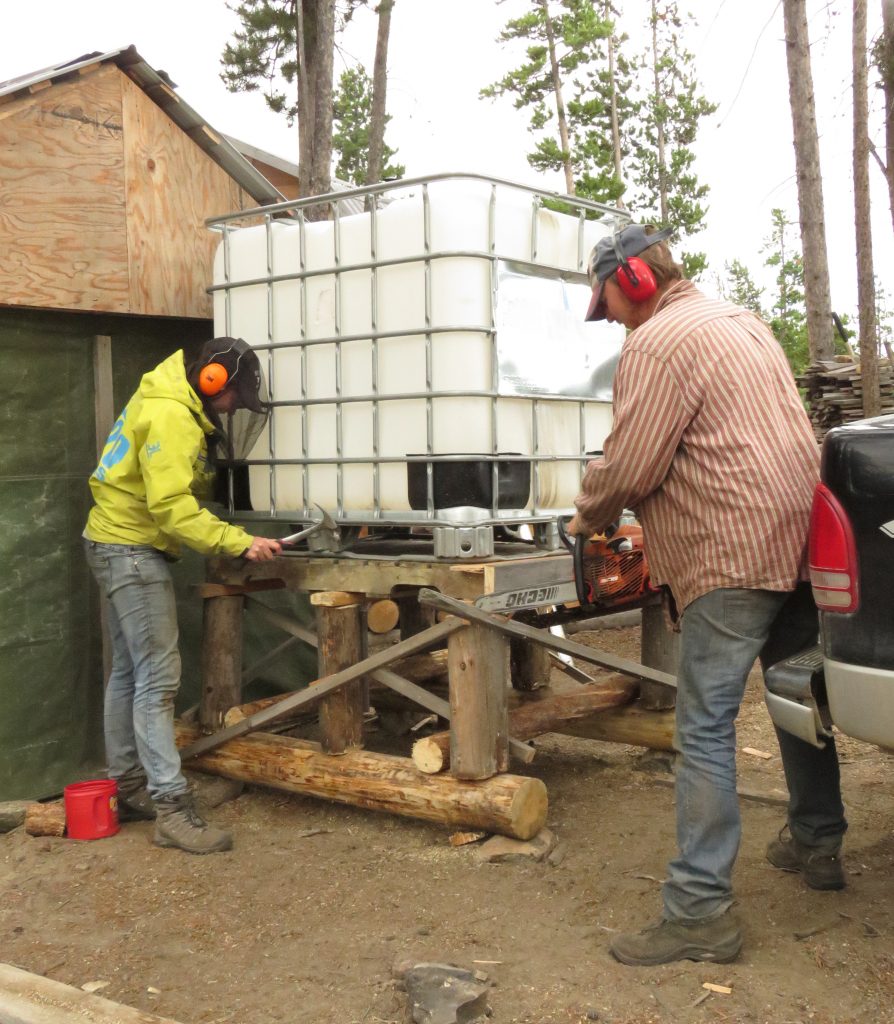
This tank also had to be washed out, and we took it to the river. The neighbour’s dog absolutely loved biting at the water.
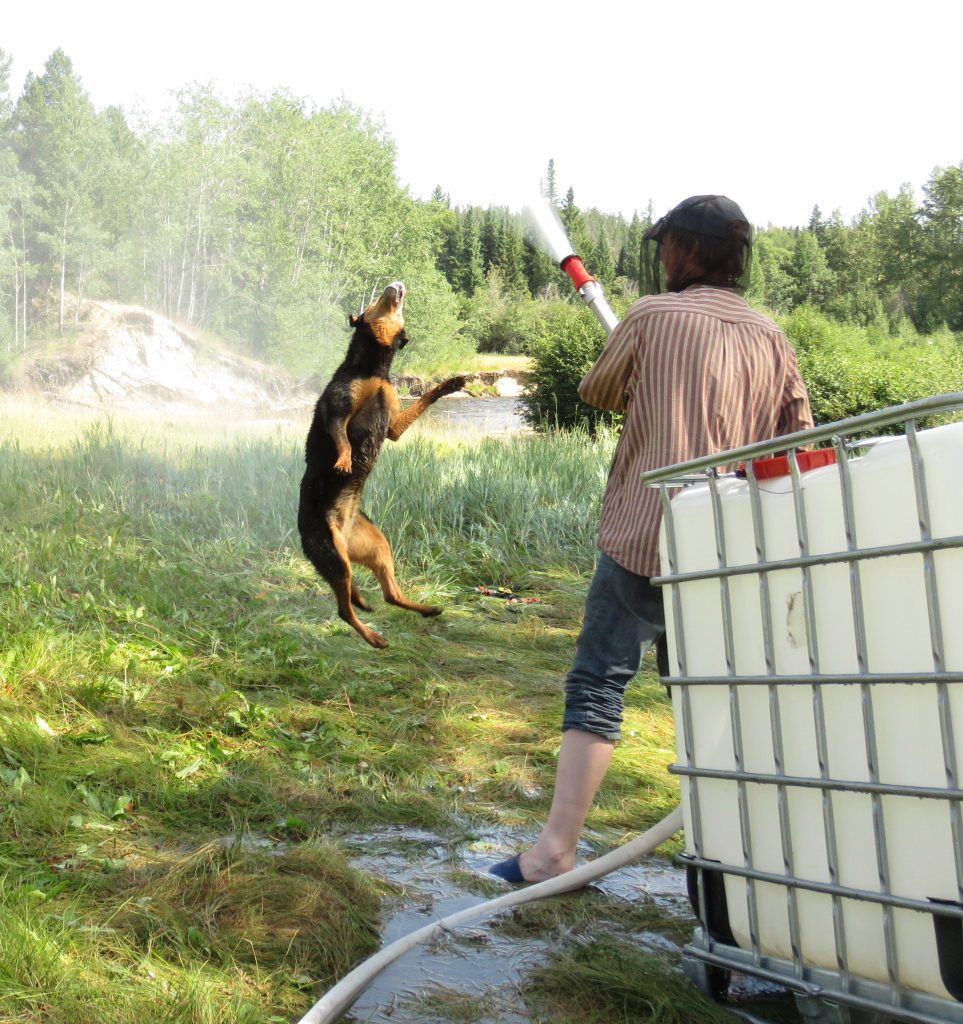
At first we only had the heavy fire pump. It had to be dragged with us to the river, then dragged back to the house to fill the stationary tank. I could carry only half a tank in the pickup at once, so this process required two trips – lugging that heavy pump around each time. I had been researching all kinds of pumps – solar, ram, electric and gas, and all were either impractical or unavailable immediately – everyone was blaming the covid both for scarcity and for erratic delivery. Another gas pump was the quickest solution – it was to be two weeks before it arrived.
We had taken all the irrigation hoses to the river and blasted them clean under pressure, also bent them back and forth between our hands. This got them functioning again, but only under pressure. So the pump was used again to water the garden. This meant changing fittings, and it soon became apparent that the weak plastic thread on the outlet of the tanks was going to strip very quickly. A trip to town produced various-sized iron fittings to fit the different suction and fire hoses. Daniel is siliconing the master connection in place.
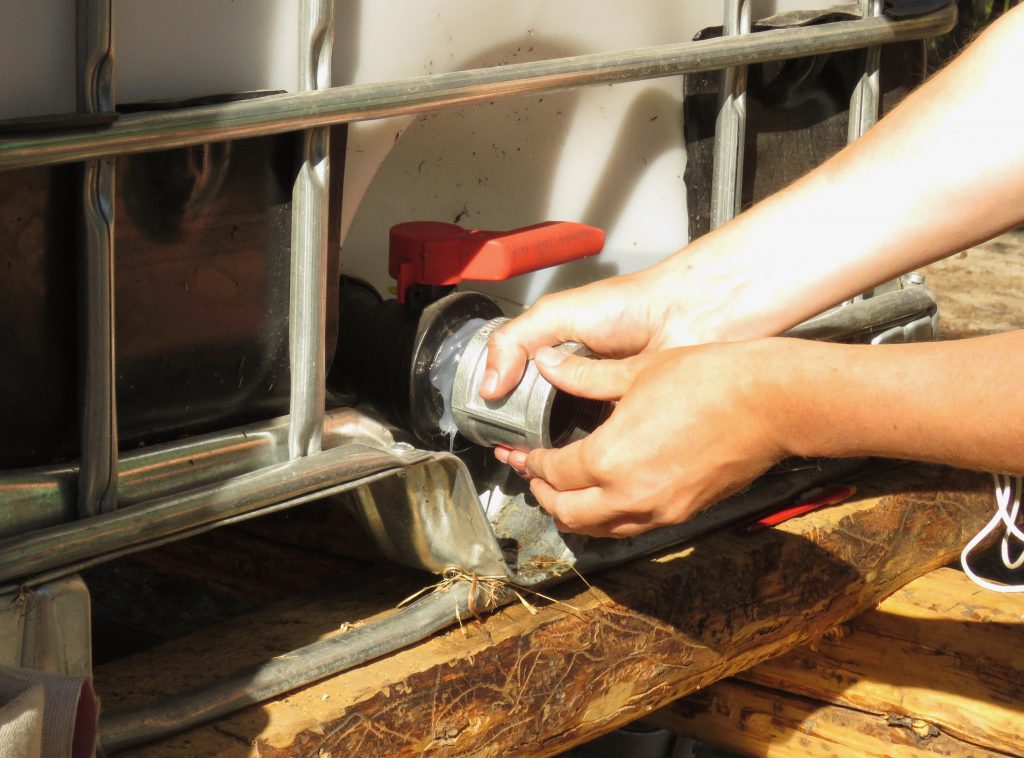
But another problem immediately reared its head. The fittings rusted almost at once, and could not be unscrewed without risking ripping the whole outlet off the tank. Apparently there is some kind of thread sealer available but it will have to wait for my next trip to town. In the mean time we are using teflon tape and unscrewing the fittings immediately after use.
At last, the second pump arrived. We installed that one beside the river.
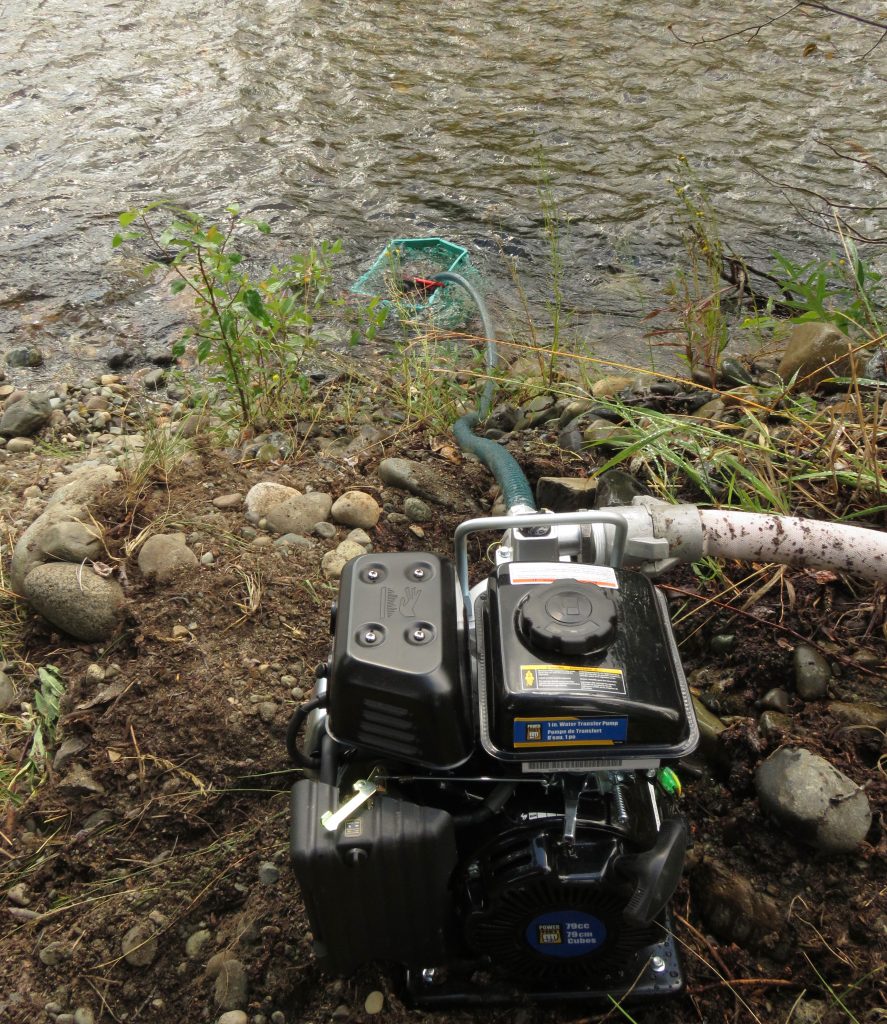
The hose took the water up to the truck. (Note the constant use of headsets. Bugs were terrible this year – particularly beside the water.)
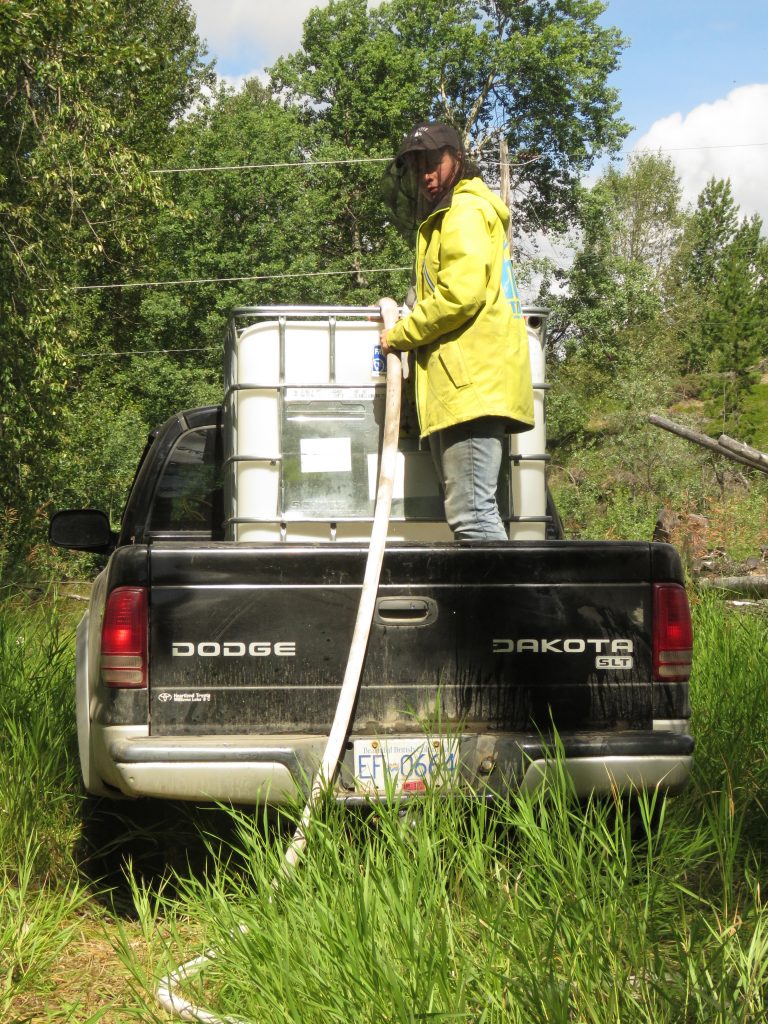
And then the fire pump could be left at home. It could be used for both transferring the water and irrigating the garden. After some experimenting, it seemed that half a tank did one watering and that lasted two days (in this cool, somewhat damp summer), so three half-tanks would last most of a week.
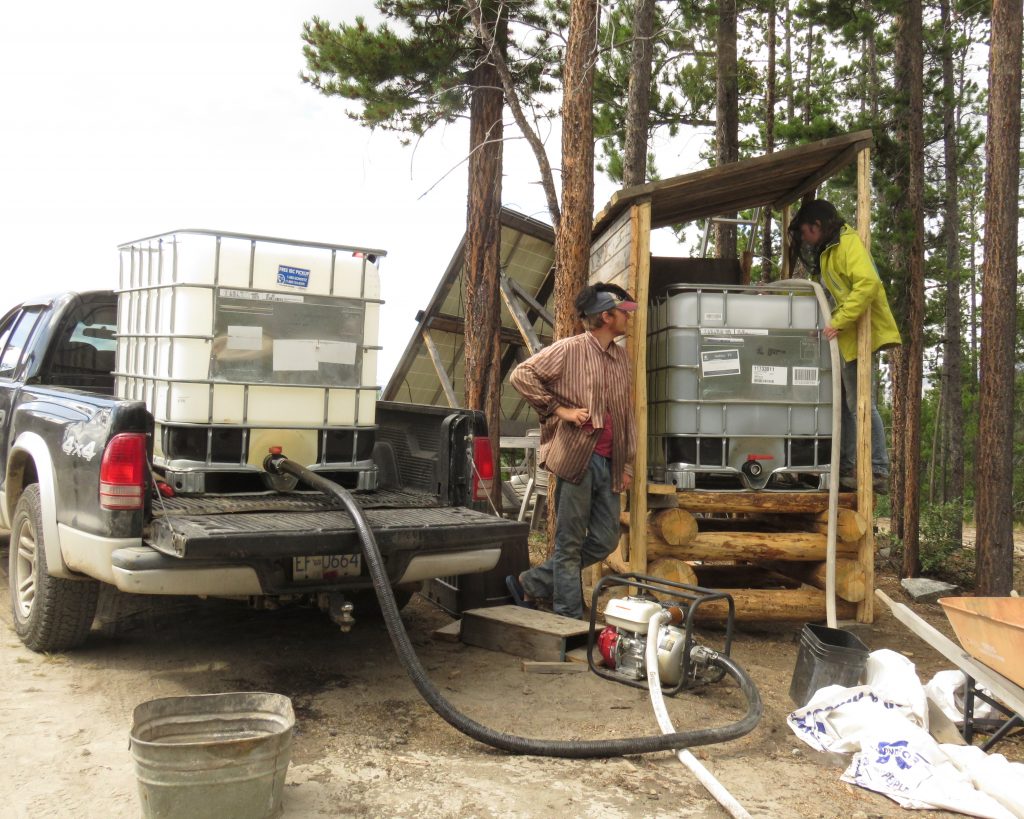
In the mean time, a little bit of water had come back into the well. I tested the depth several times, but often found none. However, I seemed to be able to get enough to do dishes and the like and an occasional laundry. (I have no shower or flush toilet.)
The reverse osmosis filter rejects three times the water it produces; I didn’t want to spend my life hauling drinking water from the neighbours’, so I looked for an alternative and came up with the Berkey filter, a system that eliminates pathogens and heavy metals . It has been used for years in disaster situations. So much so that, with the covid, it had become unavailable as people were panicking that they would be isolated forever! Eventually I found a damaged medium-sized one for about $150 off (it proved to have the tiniest ding near the top), and the next job was to devise a stand for it.

It works very well. This model holds 3 US gallons and filters it in about two hours. I have no arsenic or fluoride so do not need those special filters, but it deals with all other heavy metals and 99.999% pathogens. I have been having fun filtering both river and well water. Although the unit extracts harmful stuff, it still retains beneficial minerals. This means the well water has a stronger flavour than the river water. River water will not be practical for me to obtain in the winter, but for now I can enjoy pristine gourmet teas at their best!
All this is why I have not posted for such a long time. The water situation has consumed weeks of my time. Even in winter, when I am not watering the garden, the system will not be quite so convenient as before the well ran dry, but after all, I spent 30 years of my life melting snow and hauling water in a bucket, so I can’t really complain.

I wish we had some news from Chris.
Haven’t seen any blog posts in a few months and was hoping things are ok with you. Take care and stay safe.
Hello Chris, we are hoping all is well with you, we haven’t seen a ‘blog’ from you since August. True and thinking of you.
Anne Silins, in Chemainus. Oct. 30, 2020
You seem to get proficient and willing volunteer workers to help you. And I’m sure they appreciate all the skills they learn and hone at your place.
Wow Chris!!!!!! What a summer!!!!
Nothing is ever simple or easy when we live off grid.
Really enjoyed your flower photos and also your stories.
I hear reports of a cold snowy winter in the forecast. Having extra wood stored away is a good idea. Hope you have a few more weeks to get ready for the long, cold darkness…… Bonnie Sager
Oh dear! What a nightmare! I’ve been living without Hydro for two years, but without running water – no – thank you! And I had to melt snow for a while, so I know how much snow it takes to get a days cooking supply… With all my heart I wish you very few and very tiny bugs and ample of good water for the rest of your life!
Alice Les Landes recently posted…Online Coaching
My goodness, what a saga! Not only time consuming, but probably very expensive as well. And I remember all to well what it is like to work wearing bug nets…makes everything that much slower. I think “persistence” or maybe “stubborness” may be your middle names. I’m so sorry you had to go through all of that.